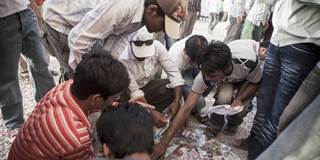OPEC succeeded in protecting its members’ shared interests that they could not protect individually, and it shows that when a market has structural distortions, political tools and collective action can be more effective than public policy. The migrant-labor market is not so different from the oil market.
DUBAI – In September 1960, delegates from Iran, Iraq, Kuwait, Saudi Arabia, and Venezuela met in Baghdad to form the Organization of Petroleum Exporting Countries. As the world’s dependence on oil increased, so did OPEC’s power. Today, with many developing countries, including a majority of the countries in the Middle East, serving as some of the world’s main labor exporters, might it be time to consider the formation of an OPEC-like cartel for migrant workers?

DUBAI – In September 1960, delegates from Iran, Iraq, Kuwait, Saudi Arabia, and Venezuela met in Baghdad to form the Organization of Petroleum Exporting Countries. As the world’s dependence on oil increased, so did OPEC’s power. Today, with many developing countries, including a majority of the countries in the Middle East, serving as some of the world’s main labor exporters, might it be time to consider the formation of an OPEC-like cartel for migrant workers?